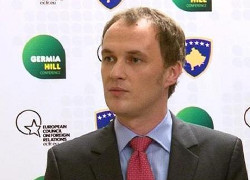Petrit Selimi: It will help us all in Balkans to normalize relations after brutal wars
6- 22.04.2013, 17:53

Petrit Selimi, a deputy foreign minister of Kosovo, gave an exclusive interview to charter97.org.
It should be reminded that Serbia and Kosovo reached a EU-mediated deal to normalise relations on April 19. The deal is extremely important for Serbia, as the solution of the Kosovo problem allows Belgrade to discuss conditions for the country's joining the EU.
The deal was reached after a bloody ethnic conflict between Kosovo's Albanian majority and the Serbs. The region unilaterally declared its independence in 2008. It is recognised by the US and most of the EU member states. The Serbian authorities continued to repeat they considered Kosovo to be a part of Serbia and would never recognise its independence.
Petrit Selimi, a deputy minister of foreign affairs of Kosovo, said in an interview with charter97.org that April 19 was a “historic day for Kosovo”.
- First of all congratulations on the great day of signing the agreement with Serbia! Tell me not as a politician but as a kosovar what it means for you emotionally.
- This is a historic day for Kosovo but we had many events in history that were more emotional, from liberation by NATO in 1999 to Declaration of Independence in 2008. I think agreement between Kosovo and Serbia that recognizes Kosovo's independent laws and constitution is a step in right direction that will help us all in Balkans to normalize relations after decade of brutal wars
- And now tell me as Deputy Foreign Minister what it means for Kosovo?
- Kosovo is already independent, recognized so by almost 100 UN Members, including most members of United Nations, 2/3 of EU and NATO members, and 2/3 of Council of Europe Members. We are also sovereign member of World Bank and IMF but the agreement will now allow for Kosovo to engage with the rest of the world that has not recognized Kosovo yet. Some countries were reluctant to recognize Kosovo but now have a very good opportunity to do so. Also, the agreement enables decentralization and implementation of Kosovo laws in north of the country that was so far ruled by circles under authority of Belgrade. This agreement ends this authorizes Kosovo police as the only one valid.
- Is the agreement mutually benefitial for both Serbia and Kosovo or somebody did win and somebody lost?
- No, I truly think agreement was good for all. It was good for EU to show it can persuade sides to follow European standards of good neighborly relations by using soft diplomatic power and Baroness Ashton did a great job. It is good for Kosovo as it reinforces the sovereignty and it solves one problem we had with Serbian enclaves in north, and it is also good for Serbia as it recognizes reality of Kosovo and for this gets confirmed candidate status for EU membership. Kosovo also starts its formal EU accession process with this agreement.
- What possibilities does it open? Is your goal to strengthen your independence and integrate in the EU or is it different?
- Kosovo is reforming its state, politics, economy and these reforms as well as signing of normalization agreement with Serbia, enables us to receive Stabilization and Association Agreement, which is the first formal step for EU accession. We hope EU will approve of this formal step already in the next weeks so we can move ahead on our separate roads to EU, both Kosovo and Serbia. We have also followed the statements from Romania, Slovakia, Greece and others who don't recognize Kosovo yet but may choose to do so now as Serbia also agreed with normalizing ties.
- Again a personal question: you were active in fighting for independence — when you had a feeling that impossible is possible?
- Kosovars fought a very long battle for freedom. You have to remember that we became part of modern Serbia and Yugoslavia after the fall of Ottoman Empire and we were subjugated to harsh treatment for 100 years. While we also waged a guerrilla war against Milosevic's Serbia, we always had Western ideals of liberty, democracy and freedom as guides. We never supported radicalism and all mainstream politicians in Kosovo were always for NATO and EU membership. Kosovo streets are named after Bill Clinton and Tony Blair. The most difficult period we had was 1990's that culminated with NATO bombing of Serbia to prevent genocide. After liberation came, we knew we will be a state. It was important to stay true to values of open society to receive Western backing for our cause.









